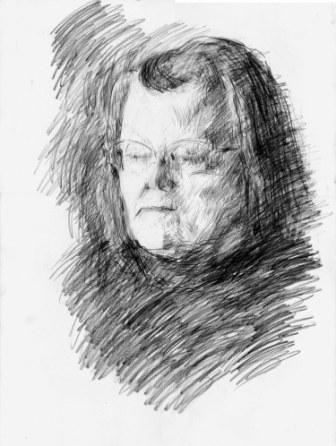A friend has given me a most wonderful book containing descriptions of the various peoples of China, perhaps 450 different ethnic groups. Bob gave it to me because he had just re-read my The Irrational Doorways of Mr. Gerard, and was reminded of my fascination for little-known tribes, especially those of Russia, the Middle East, and China.
One of the groups discussed in this book is the Diao, 2000 people, one of the minorities of the province of Guizshou. It is said of these Guizhou minorities that “the making of her traditional dress continues to play an important part in a woman’s life. Each tribe’s dress has its own background story which reflects that group’s customs, history and beliefs. Cultural identity is therefore maintained by the making and wearing of the garments.”
My father’s mother died in 1913 and so lived all her life wearing a long dress. Long dresses have occasionally become fashionable in my lifetime although they have never become mandatory. When I wear one, I have to be extra careful not to trip, especially on stairs. I wonder if women tripped and fell more before 1918 when wearing long dresses went out of fashion. I am exceptionally clumsy so perhaps I don’t represent the norm, but wearing a long dress to do chores must have been awkward. My mother’s mother lived to 1985, and thus she wore short dresses most of her life. She did always wear dresses, though, never slacks. Both of my grandmothers were professional seamstresses, that is, they sewed for other people for money.
If I were to sew my own dress to tell the story of my customs, history, and beliefs, what could I make? What could my grandmothers have made? The cloth I would use would have been woven in another country – Thailand perhaps. At the moment I am wearing a pair of jeans and a t-shirt. Is there any seamstress in the western world who makes her own jeans? I’ve never seen a pair of homemade jeans.
Have we women lost something, being so far removed from the creation of what we wear? And from what we cook? We surely have gained time. Part of my fascination for little-known ethnic people is trying to figure out how they maintain their distinctiveness. How do they keep their language, for example? Most of the peoples in this book do speak mandarin Chinese in addition to their own language. I still have my Massachusetts accent, but I notice when I go back to visit my hometown, that most of the young people speak "American."
Sunday, July 23, 2006
Subscribe to:
Post Comments (Atom)

1 comment:
Reminds me of a statement from DR Wilder Penfield, whom you might remember as a pioneering brain researcher (Cdn). He once suggested that people who spoke a minority language in another cultural milieu should make a practice of speaking that minority language in an "essential room" of the house: like the eating area (dining room, kitchen, whatever).
He opined that we all need to eat, that we are all likely to meet to eat and converse, and that having to ask for food or whatever to be passed in the minority language ensured that that language would be used, and remembered.
As to speaking "American", i notice that even our daughter is beginning to bend vowels like northern US people. TV...
Post a Comment